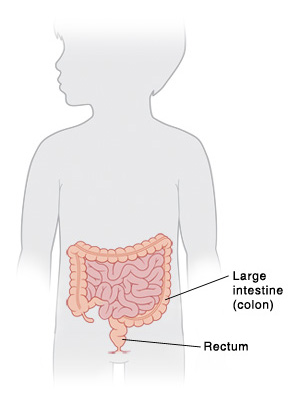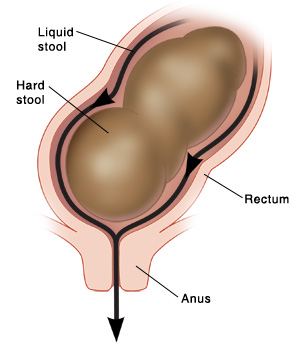When Your Child Has Encopresis
When Your Child Has Encopresis
Your child has uncontrolled leakage of stool from the opening where stool leaves the body (anus). This is called encopresis. The leakage is caused by the backup of dry, hard stool (constipation). Hard stool piles up at the end of the rectum. This is where stool is stored before leaving through the anus. The lower colon and rectum may become stretched out. Your child may not even feel the need to have a bowel movement. In time, liquid stool leaks around the blockage and out through the anus. This leakage often happens without your child’s knowing it. Encopresis can be treated to stop this occurring.
What are the symptoms of encopresis?
Leakage of liquid stool onto the underwear
Stool leakage with the passing of gas
Pain around or below the belly button
No feeling of having to pass stool before leakage happens
Swelling or bloating of the belly (abdomen)
What causes encopresis?
Encopresis is caused by constipation. Some causes of constipation that may lead to encopresis include:
Child holding back stool, due to prior painful bowel movement or another reason
Hirschsprung’s disease, a birth defect in which nerves in the large intestine (colon) are missing
An anus that is closer to the vagina or penis than normal (anteriorally placed anus)
How is encopresis diagnosed?
The healthcare provider will ask about your child’s symptoms. He or she will give your child a physical exam. Your child may have blood tests to check for other problems.
How is encopresis treated?
Your child may be prescribed a stool softener. These will help your child have normal bowel movements.
The healthcare provider may suggest changes in diet, such as adding more fiber. Fiber helps stool retain water.
Your child may need to drink more water and get regular exercise.
Your child may have bowel retraining. This process can help your child have normal bowel movements. Your child sits on the toilet for a short time after meals. This helps the body reconnect eating with having bowel movements. Your healthcare provider will talk to you about the best way to start bowel retraining. Be patient. It can take 4 to 6 months or longer before encopresis goes away.
Updated:
October 03, 2017
Sources:
Functional fecal incontinence in infants and children: Definition, clinical manifestations and evaluation. UpToDate., Chronic functional constipation and fecal incontinence in infants and children: Treatment. UpToDate., Coehlo, DP. Encopresis: A Medical and Family Approach. Pediatric Nursing (2011); 37;3; pp. s107-s112, Encopresis: Not just an accident. Mosca, N. NASN School Nurse. 2013, is. 28, ed. 5, pp. 218-21., Functional constipation in infants and children: Clinical features and differential diagnosis. UpToDate., Nocturnal enuresis in children: Etiology and evaluation. UpToDate., Toilet training. UpToDate.
Reviewed By:
Freeborn, Donna, PhD, CNM, FNP,Lehrer, Jenifer, MD

